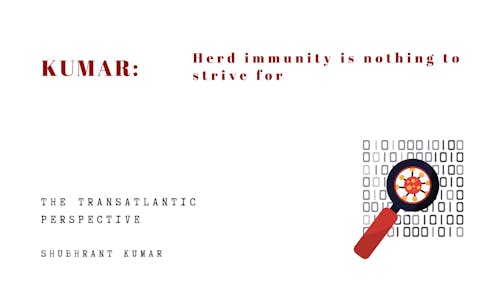KUMAR: Herd immunity is nothing to strive for

In the short span of just a few months, it has become commonplace for governments across the globe to enforce strict lockdown measures in ongoing efforts to slow the spread of the highly contagious coronavirus disease (COVID-19).
That being said, the Swedish government has opted for an anomalous approach of not instituting any form of lockdown measure whatsoever within the country, while broadly urging its inhabitants to follow social distancing measures. This laissez-faire approach to what is possibly the worst public health crisis in a generation is egregious to say the least, and one only needs to look at Sweden's rising mortality rate relative to its Scandinavian neighbors, Finland and Denmark (both of which have imposed strict lockdowns in their respective regions).
Now is not the time for the Swedish government to play Russian roulette, so to speak, by potentially endangering the lives of its citizens by forcing them to participate in this highly risky experiment and by also setting a dangerous precedent for those who doubt the effectiveness of strict social distancing measures to mitigate the effects of the virus.
The ultimate goal of reaching herd immunity is central to the Swedes' justification for its decisions to forgo strict lockdown measures in the country, which it argues is the better way to deal with the rapid spread of COVID-19. This is achieved when most of a population is immune to an infectious disease, thus providing indirect protection - or herd immunity (also called herd protection) - to those who are not immune to thedisease.
Herd immunity has quickly become a contentious issue ever since the British government publicly advocated the approach by initially resisting lockdown measures, before quickly backtracking by officially enforcing an ongoing national lockdown after much public scrutiny and projections of an alarmingly high mortality rate.
Sweden's strategy of sidestepping strict social distancing measures is short-sighted to say the least, as it is based on a flimsy "what if" scenario, since as of yet there is no sound evidence to suggest that someone who has recovered from the virus cannot get the infection again, thus having serious implications for the strategy in the long term.
In the last few weeks in the United States there has been much resistance to the stay-at-home orders imposed by the governors of most states in an effort to "flatten the curve" by delaying the spread of the virus so as to alleviate the burden on the healthcare system.
When countries like Sweden avoid shutdowns of any kind, all it does is exacerbate the problem as many skeptics of social distancing measures - some of whom have taken to the streets to publicly protest the national lockdown - will have a basis for their harmful actions.
It should be noted that using Sweden as a template for how other countries should deal with COVID-19 is like comparing chalk to cheese. The Swedish healthcare system is rated highly across the board due to its strong infrastructure, which is funded generously by the government.
This is a far cry from the healthcare system in the U.S., which has myriad problems and would collapse under the immense stress of a strong surge in COVID-19 cases which is indisputable if lockdown measures are removed. Meanwhile Sweden, a country with a population of just 10 million and a strong healthcare system, would be prepared to deal with an unprecedented rise in cases.
That is not to say that what Sweden is doing is justifiable or even effective since it currently holds the highest death rate out of any of the Scandinavian countries, which is only expected to rise in the next few weeks.
The majority of deaths are being reported in care homes that are homes to millions of senior citizens above the age of 60. In my opinion, the Swedish government obviously has little regard for this demographic and is more than happy to make them the guinea pigs in this questionable scientific experiment they are engaged in. And what of the youth of the country?
Schools and universities remain open in the country which could have major repercussions going into the future, as scientists are still not sure what impact the virus can have on younger generations. Yet they too are thrust into the callous experiment.
Ultimately there are far too many uncertainties about COVID-19 to not adhere to strict social distancing measures that have been advised by the majority of experts. Now is not the time to gamble with people's lives, but to take decisive action that can unite us all in the international times which are only going to get progressively challenging until the development of an effective vaccine.
Shubhrant Kumar is a School of Arts and Sciences junior majoring in political science. His column, "The Transatlantic Perspective," runs on alternate Mondays.
*Columns,cartoons and letters do not necessarily reflect the views of the Targum Publishing Company or its staff.
YOUR VOICE|The Daily Targum welcomes submissions from all readers. Due to space limitations in our print newspaper, letters to the editor must not exceed 900 words. Guestcolumns and commentaries must be between 700 and 900 words. All authors must include their name, phone number, class year and college affiliation or department to be considered for publication. Pleasesubmit via email to oped@dailytargum.com by 4 p.m. to be considered for the following day's publication. Columns, cartoons and letters do notnecessarily reflect the views of the Targum Publishing Company or its staff.



